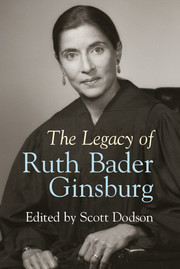Book contents
- Frontmatter
- Contents
- Contributors
- Preface
- Acknowledgments
- Part I Shaping a Legacy
- 1 Notes on a Life
- 2 Ruth Bader Ginsburg
- 3 Before Frontiero There Was Reed
- 4 Struck by Stereotype
- A Postscript to Struck by Stereotype
- 5 Beyond the Tough Guise
- Part II Rights and Remedies
- Part III Structuralism
- Part IV The Jurist
- Notes
- Index
3 - Before Frontiero There Was Reed
Ruth Bader Ginsburg and the Constitutional Transformation of the Twentieth Century
Published online by Cambridge University Press: 05 February 2015
- Frontmatter
- Contents
- Contributors
- Preface
- Acknowledgments
- Part I Shaping a Legacy
- 1 Notes on a Life
- 2 Ruth Bader Ginsburg
- 3 Before Frontiero There Was Reed
- 4 Struck by Stereotype
- A Postscript to Struck by Stereotype
- 5 Beyond the Tough Guise
- Part II Rights and Remedies
- Part III Structuralism
- Part IV The Jurist
- Notes
- Index
Summary
What’s fair? The cries of the playground – “that’s fair,” “that’s not fair” – echo throughout our adult lives. Sometimes an entire society’s understanding of what’s fair shifts in a decade, a year, even a single day. Children of Jehovah’s Witnesses refuse to salute the flag in school and change the way a nation views the First Amendment. Oliver Brown thinks it’s unfair that his daughter can’t attend her neighborhood school. Rosa Parks refuses to give up her seat on a Montgomery bus. Together they change definitions of what counts as equality. Sometimes you go to sleep one night, and when you wake up, the rules have changed. That happened on November 22, 1971, when the U.S. Supreme Court ruled for the first time that arbitrary discrimination on the basis of sex could be a denial of equal protection of the laws.
The case that triggered this shift was a modest one. It came from a small state (Idaho) and involved hardly any money ($930, which lawyers’ fees completely consumed). To most people, the dispute seemed merely a family squabble, hardly worth the expensive attention it would get. It is the rare constitutional law casebook in which it figures in more than a footnote. Yet Sally Reed’s complaint was far from trivial. It disrupted well-established rules of fairness and spurred broad social transformation in the ways that both men and women make some of the most important choices in their lives.
- Type
- Chapter
- Information
- The Legacy of Ruth Bader Ginsburg , pp. 31 - 43Publisher: Cambridge University PressPrint publication year: 2015



